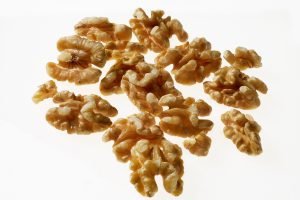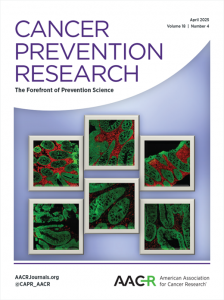There are new findings out about the benefits of eating walnuts. Results from a UConn School of Medicine clinical trial on the cover of the April edition of the journal Cancer Prevention Research show walnuts improve systemic inflammation while also reducing colon cancer risk.
Why walnuts?

Ellagitannins, plant-derived polyphenol compounds found in walnuts, are shown to be metabolized exclusively by the gut microbiome into a wide range of anti-inflammatory molecules called urolithins. These urolithins are associated with very potent anti-inflammatory properties and may even inhibit cancer.
“Ellagitannins in the walnut are importantly providing the anti-inflammatory and anti-cancer properties that we’re seeing in patients in our clinical trial research, particularly the gut’s conversion of ellagitannins to a potent anti-inflammatory agent, urolithin A,” reports Daniel W. Rosenberg, Ph.D. and his multidisciplinary team of researchers at the UConn School of Medicine.
Rosenberg serves as the HealthNet Chair in Cancer Biology and is an Investigator in the Center for Molecular Oncology. He has studied walnut properties for more than a decade and has researched the connection between walnut consumption and its anti-inflammatory properties.
The UConn research team’s clinical trial findings show that high levels of urolithin A formation by the gut microbiome from walnut consumption has a positive impact on reducing inflammatory markers across blood, urine, and fecal samples, and may even positively affect the immune cells within colon polyps.
For the clinical trial, patients between the ages of 40 to 65 years and at an elevated risk for colon cancer, were referred for the study from the Division of Gastroenterology at UConn Health, the University of Connecticut’s academic medical center. Each of the 39 enrolled study participants were screened by the clinical research team at UConn John Dempsey Hospital and asked to complete an NIH Food Frequency Questionnaire for analysis by Ock Chun Ph.D., a nutritional epidemiologist in the College of Agriculture, Health and Natural Resources at UConn Storrs. Patients were asked to avoid all ellagitannin-containing foods and beverages for a week to set their urolithin levels at or close to zero before they began consuming ellagitannin-rich walnuts as part of their closely monitored diet. At the end of the three-week study, all participants received a high-definition colonoscopy performed by Drs. John Birk and Haleh Vaziri.
Among the key findings, the researchers found that elevated urolithin A levels in the urine of patients correlated with the serum levels of peptide YY, an interesting protein that has been associated with inhibition of colorectal cancer. Reduced levels of several inflammation markers present in the blood were also found, especially in obese patients that had the greatest capacity to form urolithins by their gut microbiome.

Rosenberg also used high-dimensional spatial imaging technology that allowed UConn researchers to develop a detailed view of the direct cellular interactions present inside colon polyps that were removed during colonoscopy at the end of the walnut study. This cutting-edge advanced imaging technology revealed that patients with high levels of urolithin A formation following walnut consumption was directly associated with reduced levels of several important proteins that are often present in polyps, showing for the first time how walnut ingestion may directly enhance colon health.
The research team also discovered that the protein vimentin, often associated with more advanced forms of colon cancer, was greatly reduced inside polyp tissues obtained from patients who had also formed the highest levels of urolithin A by their gut microbiome.
These important new research findings build upon the earlier work of Dr. Masako Nakanishi, an assistant professor in the Rosenberg Lab, who showed in several earlier publications that walnuts had beneficial and anti-cancer effects in the colons of cancer-prone mice, key findings that prompted the current clinical trial.
“Urolithin A has a very positive influence on inflammation and maybe even cancer prevention,” says Rosenberg. “Our study proves that dietary supplementation with walnuts can boost the general population’s urolithin levels in those people with the right microbiome, while significantly reducing several inflammatory markers, especially in obese patients.”
Rosenberg concludes, “Our study provides strong rationale for dietary inclusion of walnut ellagitannins for cancer prevention. Nutrients from walnuts can contribute to reduced cancer risk. There are many potential benefits one can get from eating walnuts, with so little downside risk, that just grabbing a handful every day is really something that you can easily do for your long-term health benefit.”
This research is supported by generous awards from the American Institute for Cancer Research, the California Walnut Commission, and the National Cancer Institute.
Want to help UConn further its clinical trial studies of the impact of walnuts on colon health? Join our Walnut Study!
Learn more or contact The Clinical Research Center directly via 860-679-2939/ gajewska@uchc.edu or 860-679-3088/ pappleton@uchc.edu.



